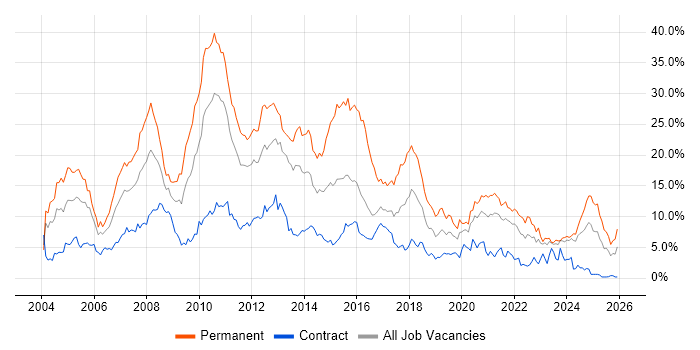Microsoft .NET (dotNet)
Tyne and Wear > Newcastle upon Tyne
The table below provides summary statistics for permanent job vacancies advertised in Newcastle upon Tyne requiring .NET skills. It includes a benchmarking guide to the annual salaries offered in vacancies that cited .NET over the 6 months leading up to 31 May 2025, comparing them to the same period in the previous two years.
| 6 months to 31 May 2025 |
Same period 2024 | Same period 2023 | |
|---|---|---|---|
| Rank | 11 | 24 | 29 |
| Rank change year-on-year | +13 | +5 | -10 |
| Permanent jobs citing .NET | 43 | 68 | 60 |
| As % of all permanent jobs advertised in Newcastle upon Tyne | 13.03% | 6.31% | 7.81% |
| As % of the Libraries, Frameworks & Software Standards category | 51.19% | 44.44% | 31.41% |
| Number of salaries quoted | 38 | 63 | 36 |
| 10th Percentile | £25,000 | £36,750 | £38,750 |
| 25th Percentile | £38,750 | £42,500 | £49,688 |
| Median annual salary (50th Percentile) | £55,000 | £55,000 | £55,000 |
| Median % change year-on-year | - | - | +4.76% |
| 75th Percentile | £70,000 | £65,000 | £60,000 |
| 90th Percentile | £103,750 | £70,200 | £63,750 |
| Tyne and Wear median annual salary | £55,000 | £60,000 | £55,000 |
| % change year-on-year | -8.33% | +9.09% | +4.76% |
All Software Libraries and Frameworks
Newcastle upon Tyne
.NET falls under the Software Libraries and Frameworks category. For comparison with the information above, the following table provides summary statistics for all permanent job vacancies requiring technical specification, industry standards, software libraries and framework skills in Newcastle upon Tyne.
| Permanent vacancies with a requirement for technical specification, industry standards, software libraries and framework skills | 84 | 153 | 191 |
| As % of all permanent jobs advertised in Newcastle upon Tyne | 25.45% | 14.19% | 24.87% |
| Number of salaries quoted | 73 | 142 | 104 |
| 10th Percentile | £35,750 | £35,000 | £38,668 |
| 25th Percentile | £41,250 | £41,500 | £48,750 |
| Median annual salary (50th Percentile) | £56,500 | £55,000 | £56,500 |
| Median % change year-on-year | +2.73% | -2.65% | +10.78% |
| 75th Percentile | £70,000 | £67,188 | £67,500 |
| 90th Percentile | £100,000 | £75,770 | £72,500 |
| Tyne and Wear median annual salary | £55,750 | £56,000 | £56,000 |
| % change year-on-year | -0.45% | - | +12.00% |
.NET
Job Vacancy Trend in Newcastle upon Tyne
Job postings citing .NET as a proportion of all IT jobs advertised in Newcastle upon Tyne.

.NET
Salary Trend in Newcastle upon Tyne
3-month moving average salary quoted in jobs citing .NET in Newcastle upon Tyne.
.NET
Salary Histogram in Newcastle upon Tyne
Salary distribution for jobs citing .NET in Newcastle upon Tyne over the 6 months to 31 May 2025.
.NET
Co-occurring Skills and Capabilities in Newcastle upon Tyne by Category
The follow tables expand on the table above by listing co-occurrences grouped by category. The same employment type, locality and period is covered with up to 20 co-occurrences shown in each of the following categories:
